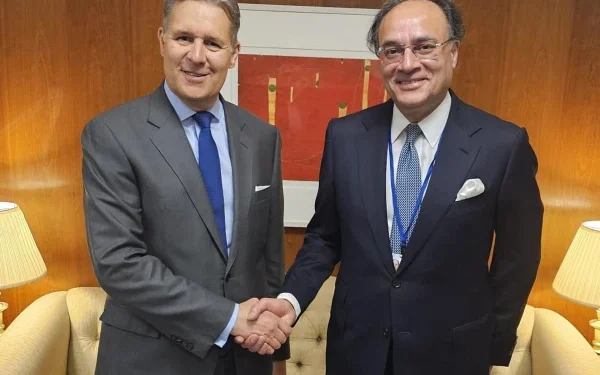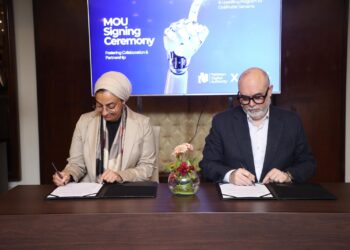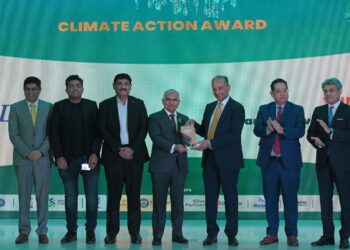WASHINGTON, D.C. — In a strategic move to bolster economic relations and address the growing trade imbalance between Pakistan and the United States, Federal Minister for Finance and Revenue Muhammad Aurangzeb met with Thomas Lurston, Senior Official in the Office of the Under Secretary for Economic Growth, Energy, and Environment at the U.S. Department of State. The meeting underscored Pakistan’s commitment to fostering a more balanced and mutually beneficial trade partnership with the U.S.
Understanding the Trade Imbalance
The trade dynamics between Pakistan and the United States have been characterized by a significant imbalance. In 2024, U.S. goods exports to Pakistan were valued at $2.1 billion, while imports from Pakistan stood at $5.1 billion, resulting in a trade deficit of approximately $3 billion for the U.S. . This disparity has prompted discussions on strategies to enhance U.S. exports to Pakistan and promote a more equitable trade relationship.
Key Discussion Points in the Meeting
During the meeting, Finance Minister Aurangzeb expressed gratitude for the U.S.’s high-level participation in the recent Minerals Conference held in Pakistan. He emphasized the importance of constructive engagement to address the trade imbalance and highlighted Pakistan’s openness to exploring avenues for increased U.S. exports, particularly in sectors such as energy and technology.
Minister Aurangzeb also announced plans for a high-level Pakistani trade and investment delegation to visit the United States. The delegation aims to identify new opportunities for economic collaboration, focusing on sectors that can drive mutual growth and benefit both nations.
Exploring Energy Imports to Mitigate Trade Disparity
In a bid to reduce the trade deficit, Pakistan is considering importing crude oil from the United States for the first time. The proposed plan involves purchasing $1 billion worth of U.S. crude oil, aligning with broader efforts by Asian countries to increase U.S. energy imports and ease tariff burdens. This initiative reflects Pakistan’s proactive approach to diversifying its energy sources and strengthening economic ties with the U.S.
Impact of U.S. Tariffs on Pakistani Exports
The recent imposition of a 29% tariff on Pakistani exports by the U.S. has raised concerns about its potential impact on Pakistan’s economy, particularly the textile sector, which constitutes a significant portion of the country’s exports to the U.S. A report by the Islamabad-based think tank Tabadlab estimates that these tariffs could result in an export loss of $564 million in the fiscal year 2025-26, with the textile industry being the hardest hit. .
Strengthening Bilateral Economic Relations
Despite the challenges posed by tariffs, the United States remains Pakistan’s largest export market. In the first seven months of the fiscal year 2024-25, Pakistan’s exports to the U.S. increased by 11.23%, reaching $3.565 billion. This growth underscores the resilience of the trade relationship and the potential for further expansion.
The Federation of Pakistan Chambers of Commerce and Industry (FPCCI) has expressed optimism about doubling the trade volume between the two countries in the coming years. The FPCCI emphasizes the importance of diversifying exports beyond textiles to include sectors like information technology, pharmaceuticals, and human resources.
Leveraging the Pakistani-American Diaspora
The Pakistani-American community, comprising approximately one million individuals, plays a pivotal role in strengthening economic and cultural ties between the two nations. With over 40,000 Pakistani doctors practicing in the U.S. and plans to export 5,000 nurses, the diaspora contributes significantly to the U.S. healthcare system. Additionally, Pakistan is the largest importer of American cotton, further intertwining the economic interests of both countries.
Future Outlook and Strategic Initiatives
The meeting between Finance Minister Aurangzeb and U.S. official Thomas Lurston marks a step forward in addressing trade imbalances and enhancing bilateral economic cooperation. By exploring energy imports, diversifying export sectors, and leveraging the strengths of the Pakistani-American diaspora, both nations can work towards a more balanced and mutually beneficial trade relationship.
As Pakistan prepares to send a high-level delegation to the U.S., the focus will be on negotiating tariff relief, expanding trade opportunities, and fostering long-term economic partnerships that align with the strategic interests of both countries.

























